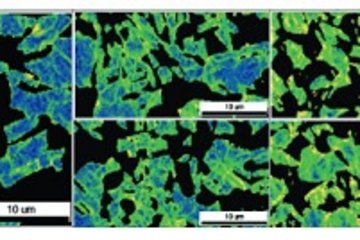All genres
1.
Journal Article
Atomistic deformation behavior of single and twin crystalline Cu nanopillars with preexisting dislocations. Acta Materialia 197, pp. 54 - 68 (2020)
2.
Journal Article
Segregation-Induced Nanofaceting Transition at an Asymmetric Tilt Grain Boundary in Copper. Physical Review Letters 121 (25), 255502 (2018)
3.
Journal Article
A machine learning approach to model solute grain boundary segregation. npj Computational Materials 4 (1), 64 (2018)
4.
Journal Article
GB code: A grain boundary generation code. The Journal of Open Source Software 3, 900 (2018)
5.
Journal Article
Migration mechanisms of a faceted grain boundary. Physical Review Materials 2 (4), 043601 (2018)
6.
Journal Article
Atomistic migration mechanisms of atomically flat, stepped, and kinked grain boundaries. Physical Review B 94 (16), 165413 (2016)
7.
Journal Article
Mechanisms and kinetics of the migration of grain boundaries containing extended defects. Physical Review B 92 (17), 174115 (2015)
8.
Talk
Computing and modelling solute-grain boundary interaction. Canadian Materials Science Conference, Vancouver, Canada (2019)
9.
Talk
Grain boundary dynamics. MMM 2018 (Multiscale Materials Modeling), Osaka, Japan (2018)
10.
Talk
Atomistic Simulations on Grain Boundary Migration. Keynote talk, MS&T Conference, Pittsburgh, PN, USA (2017)
11.
Talk
Ag segregation induced nanofaceting of an asymmetric tilt grain boundary in copper. MS&T17, Materials Science & Technology, Pittsburgh, PA, USA (2017)
12.
Talk
Complexions and dewetting. Workshop: Mechanics Meets Energy 2017, Ringberg Castle, Tegernsee, Germany (2017)
13.
Talk
Grain boundary dynamics. Seminar at Imperial College London, Thomas-Young Center, London, UK (2016)
14.
Poster
Ag segregation induced nano-facet formation at an asymmetric Cu grain boundary. Young Materials Researcher Day YMRD , Karlsruhe, Germany (2018)
15.
Poster
Ag segregation induced nano-facet formation at an asymmetric Cu grain boundary. 2nd Materials Chain International Conference MCIC 2018, Bochum, Germany (2018)











